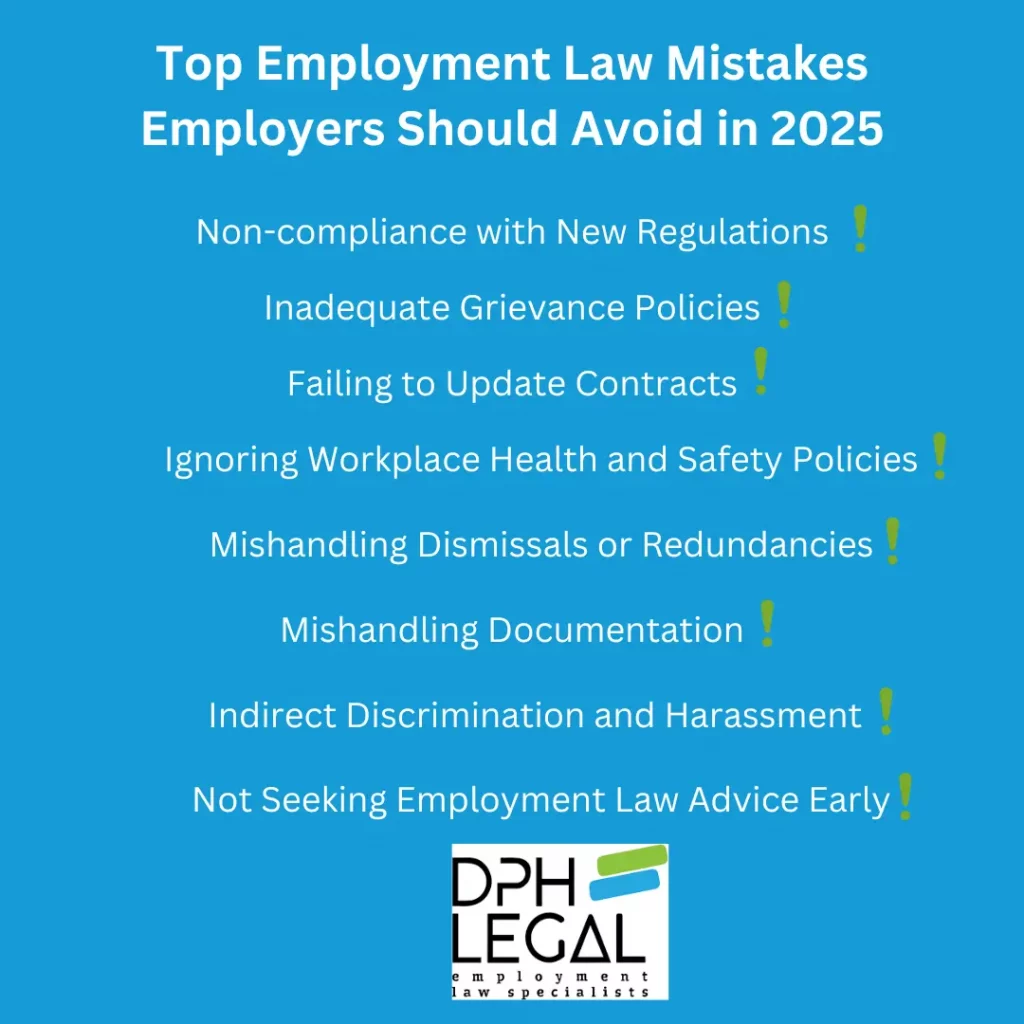

Navigating employment law in the UK can be a daunting task for employers. This is especially true as legislation evolves and workplace dynamics grow more complex. Many employers worry about accidentally making legal mistakes that could lead to costly tribunal claims. Such errors can also result in damage to their reputation or disruptions to their business operations.
From unclear policies and lack of communication to unintentional breaches of employee rights, the risk of missteps can feel overwhelming. However, these concerns can be reduced by staying informed about legal updates and implementing clear workplace policies.
Encouraging a culture of compliance and transparency also helps minimise the risk of legal mistakes.
In this blog, we’ll explore the most common employment law mistakes employers make and provide practical tips to help you avoid them in 2025.
Non-compliance with New Regulations
Ensure your business stays compliant with the latest employment laws by keeping up with key regulations, including recent changes to:
- The Employment Relations (Flexible Working) Act 2023 allows employees to request flexible working from day one and ensures employers respond more quickly and fairly.
- Carer’s Leave Act 2023: This act entitles employees caring for a dependent with long-term care to one week of flexible unpaid leave annually.
- Neonatal Care (Leave and Pay) Act 2023: Effective April 2025, this legislation allows eligible employed parents with a newborn in neonatal care to take up to 12 weeks of paid leave. It is in addition to their existing maternity or paternity leave.
- The Worker Protection Act 2023, passed on the 26th of October 2023, updates the Equality Act 2010 to help prevent workplace harassment and promote positive cultural change in organisations.
- The Strikes (Minimum Service Levels) Act 2023, introduced on the 20th of July 2023, requires essential sectors, such as health, education and transport to maintain minimum service levels during strikes.
Inadequate Grievance Policies
Employers need a clear and accessible system to handle employee complaints effectively. A well-structured grievance policy ensures that employees feel heard and that issues are addressed before they escalate. Without a proper policy, disputes may lead to low morale, poor workplace relationships or even legal claims for unfair treatment.
Failing to Update Contracts
Employment law evolves frequently and contracts should reflect these changes to remain legally compliant. Outdated contracts can leave employers vulnerable to disputes over terms, such as working hours, pay or leave entitlements. Regularly reviewing and updating employment contracts protects both the business and its employees by ensuring clarity and compliance.
Ignoring Workplace Health and Safety Policies
Ignoring workplace health and safety policies can lead to serious problems for employers, including fines, legal action and compensation claims. It increases the risk of accidents, harms employee morale and can damage the business’s reputation.
Failure to follow these policies may also void insurance and disrupt operations. Employers should enforce safety rules, assess risks and provide training to keep employees safe and avoid these issues.
Mishandling Dismissals or Redundancies
Dismissals: With the removal of the two-year qualifying period for unfair dismissal claims, employers must ensure dismissal processes are fair and well-documented. They must follow legal guidelines to prevent tribunal claims.
When discharging a problem employee, ensure that performance evaluations, pay increases and other documentation align with the reason for termination.
Placing employees on a performance improvement plan (PiP) before dismissal is advisable if poor performance is the issue. Sometimes, separation is unavoidable and consulting employment lawyers to assess risks is essential.
Employers must have a formal and transparent disciplinary process to address employee misconduct fairly. This includes clear guidelines, consistent enforcement and documented procedures to protect against claims of unfair treatment. Mishandling disciplinary actions can damage trust, lower employee morale and lead to legal challenges for the employer.
Redundancies: Employers should handle redundancies fairly and legally by following these key steps:
- Comply with the law: Follow redundancy laws, including fair selection and required notice periods.
- Communicate clearly: Be transparent about reasons and processes, keeping employees informed throughout.
- Use fair criteria: Base decisions on objective, non-discriminatory factors, such as skills or performance.
- Offer support: Provide outplacement services, career counselling or redeployment options.
- Pay entitlements: Ensure employees receive redundancy pay, notice pay and any contractual benefits.
- Support wellbeing: Offer emotional support to affected employees and address team morale.
- Get professional employment law advice: Consult HR or legal experts to ensure compliance and manage risks effectively.
This approach ensures a fair process, protects employee trust and minimises legal and reputational risks.
Mishandling Documentation
Employers should also recognise that documentation is the backbone of a fair dismissal process. Clear, objective records of performance issues, warnings or counselling are crucial to demonstrate that decisions are evidence-based and justified. Without consistent documentation, employers risk creating contradictions or appearing arbitrary, which can lead to costly disputes. By ensuring documentation aligns with disciplinary actions, employers can protect themselves while maintaining fairness and transparency.
A well-executed disciplinary process relies on thorough and consistent documentation. Employers should review the employee’s file for records of warnings, counselling or other evidence that supports the decision before taking disciplinary action or terminating employment.
In “at-will” employment situations, employers can terminate employees at any time without a specific reason, as long as it doesn’t violate anti-discrimination or other laws. However, they can still face legal risks if their documentation is incomplete or inconsistent.
Indirect Discrimination and Harassment
Employers must comply with laws protecting employees from discrimination and harassment. This includes indirect discrimination, which can unintentionally disadvantage certain groups.
Failing to address these issues can harm workplace morale and lead to legal claims under the Equality Act 2010.
Clear policies, regular training and a fair reporting process are key to preventing issues and fostering an inclusive workplace. Proactively addressing these concerns helps protect both employees and the business.

Not Seeking Employment Law Advice Early
Employment law can be complex and failing to comply can lead to costly mistakes. This includes expensive tribunal claims and significant damage to your business’s reputation.
Even small errors can disrupt operations and harm employee trust. To protect your business, avoid unnecessary risks and maintain compliance, seek employment law advice promptly whenever you’re in doubt. Contact us today for expert support and practical solutions that safeguard your business and its future.
